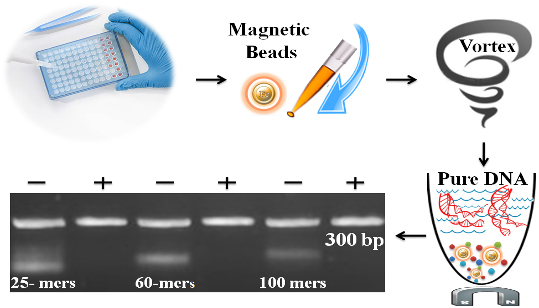- +1 858 909 0079
- +1 858 909 0057
- [email protected]
- +1 858 909 0079
- [email protected]

PCR, also called Polymerase chain reaction, is a fast and cost-effective technique used to exponentially generate copies of the target DNA under a controlled condition using buffer solution, primers, DNA polymerases, deoxynucleotides, and thermal cycler. Amplified DNA can be used for DNA sequencing, gene cloning, DNA manipulation, gene mutagenesis, in vitro transcription, detection of bacteria or viruses, diagnosis of genetic disorders, analysis of genetic fingerprints for DNA profiling, etc.
●
Not very friendly to high-throughput processing and difficult to automate (spin column).
●
Manual processing of samples can be laborious and potentially causes sample losses, lower yield, and user error.
●
Chaotropic salt and ethanol are potentially carried over into the eluted DNA and inhibit polymerase amplification.
●
Cannot wholly remove <50 bp DNA fragment.
●
PCR and DNA purification can be challenging, but magnetic bead technology can help overcome these limitations. BcMag™ One-Step PCR Cleanup Magnetic Beads are a specialized type of superparamagnetic bead that allows for rapid and efficient purification of post-PCR or other DNA reactions. Not only is the protocol simple, requiring only one tube and one step as shown in Figure 1, but it is also highly adaptable, allowing for the removal of different sized DNA fragments by adjusting processing time, buffer pH, and detergent concentration.
The magnetic beads are added directly to the completed PCR reaction or other DNA reaction and mixed using either a vortex mixer or pipetting, which captures and eliminates impurities such as excess primers, dimers, adapters, salt, detergent, dNTPs, and enzymes. Once mixed, the beads are magnetically removed, leaving behind purified and ready-to-use DNA products in the supernatant. This process takes only one minute, after which the purified DNA is immediately available for downstream applications such as Sanger Sequencing, Restriction Digestion, Cloning, SNP Detection, or Library Preparation for NGS. Additionally, the beads allow for up to 96 samples to be processed simultaneously in less than 10 minutes.

●
Simple protocol: No liquid transfer, One-tube, One-step
●
Ultrafast: One-minute protocol
●
Higher purity and recovery > 90% DNA
●
●
Cost-effective: Eliminates columns, filters, laborious repeat pipetting, and ethanol
●
High-throughput: Compatible with many different automated liquid handling systems
Magnetic Beads Make Things Simple